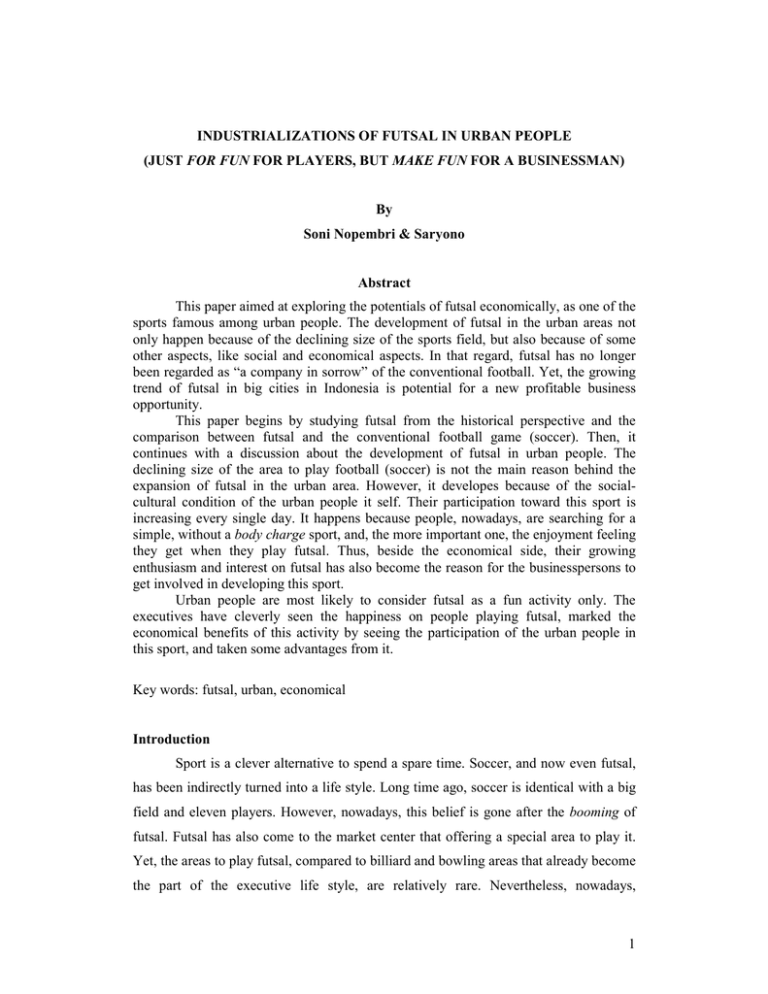This paper aimed at exploring the potentials of futsal economically,... sports famous among urban people. ... INDUSTRIALIZATIONS OF FUTSAL IN URBAN PEOPLE FOR FUN
advertisement

INDUSTRIALIZATIONS OF FUTSAL IN URBAN PEOPLE (JUST FOR FUN FOR PLAYERS, BUT MAKE FUN FOR A BUSINESSMAN) By Soni Nopembri & Saryono Abstract This paper aimed at exploring the potentials of futsal economically, as one of the sports famous among urban people. The development of futsal in the urban areas not only happen because of the declining size of the sports field, but also because of some other aspects, like social and economical aspects. In that regard, futsal has no longer been regarded as “a company in sorrow” of the conventional football. Yet, the growing trend of futsal in big cities in Indonesia is potential for a new profitable business opportunity. This paper begins by studying futsal from the historical perspective and the comparison between futsal and the conventional football game (soccer). Then, it continues with a discussion about the development of futsal in urban people. The declining size of the area to play football (soccer) is not the main reason behind the expansion of futsal in the urban area. However, it developes because of the socialcultural condition of the urban people it self. Their participation toward this sport is increasing every single day. It happens because people, nowadays, are searching for a simple, without a body charge sport, and, the more important one, the enjoyment feeling they get when they play futsal. Thus, beside the economical side, their growing enthusiasm and interest on futsal has also become the reason for the businesspersons to get involved in developing this sport. Urban people are most likely to consider futsal as a fun activity only. The executives have cleverly seen the happiness on people playing futsal, marked the economical benefits of this activity by seeing the participation of the urban people in this sport, and taken some advantages from it. Key words: futsal, urban, economical Introduction Sport is a clever alternative to spend a spare time. Soccer, and now even futsal, has been indirectly turned into a life style. Long time ago, soccer is identical with a big field and eleven players. However, nowadays, this belief is gone after the booming of futsal. Futsal has also come to the market center that offering a special area to play it. Yet, the areas to play futsal, compared to billiard and bowling areas that already become the part of the executive life style, are relatively rare. Nevertheless, nowadays, 1 badminton, volleyball, basketball’s fields and so on, are changed into futsal field. It is understandable since the growing number of the futsal fields are also growing with the enthusiasms from the community toward this game. Consequently, futsal game fields are still far from a good standard. Futsal is a game played by two teams, with five people in each of the team. Resembling soccer, the aim of this game is to score the ball to the opponent’s goal by manipulating the ball with the feet. Beside those five main players, each team is allowed to have some back up players. Yet, unlike other forms of indoor football, futsal field is delimited by lines; not by a net or a board. There was a saying that futsal is a “Kawah Candradimuka” (literally it means, “Crandradimuka Crater” but it also means the “battle field”- red) that made Samba crowned a victory as a leader of football. Unfortunately, Indonesian has just started the propaganda about this sport for these past couple of years only. If only it started earlier, the dream of PSSI (Indonesian football association- red) to perform as a national team that could act internationally might have happened. When the ‘pledge’ of futsal stroked Indonesia, many people were happy. Not only does it bring the new perspective and knowledge, but it also creates the new alternative toward Indonesians choice of entertainment, as it is played inside a building and is involving students. PSSI, as the head of the national football organization in Indonesia, is quite concerned to anticipate the futsal ‘pledge’ phenomenon. Away from the Indonesian Futsal team achievements, we have to look at the other side of futsal that has turned into a famous sport that people, from young child into adult, from the clerk into the executive, are fond of. The development of futsal it self occurs in the urban area with all of its multicultural community. Geographically, the phenomenon of futsal in the urban area appears because of the declining size of the football field (conventional football fields). However, if we want to look at it deeper, the development of futsal in urban area also happens because of the life styles of the people who prefer this kind of sport. The development of futsal in the urban area becomes the new area for the businessperson to develop this sector by taking some economical advantages from the urban people participation in futsal. The short history of futsal and its differences with Soccer 2 The word "futsal", internationally, derived from Spanish or Portuguese word, football and sala (Wikipedia, 2007). It was developed by Juan Carlos Ceriani, in Montevideo, Uruguay, in 1930 (AFC, 2003). The uniqueness of this game could gain people’s attention in the entire North America, especially in Brazil. The skills developed in this game are visible in the world-famous style of the Brazilian display outdoors on the regular size of the football fields. Pele, a famous soccer player from Brazil, for example, developed his talent playing futsal. While Brazil continues to be the center of futsal in the world, this game, now a day, in the entire world – from Europe to the Central of America and North America, Africa, Asia, and Oceania- is now played under the auspice of FIFA. The first International futsal game competition was held in 1965, and Paraguay became the first that won the South African Cup. The other six South African Cup championships were held through 1979, and the entire trophies went to Brazil. Brasil continued its dominance by winning the first Pan American Cup in 1980 and won it again in 1984. The first Futsal world cup was held by the help from FIFUSA (Before the members were joining FIFA in 1989) in Sao Paulo, Brazil, in 1982, with Brazil took the first place. Brazil, again, took another success in the second World cup championship in 1985 in Spain, but lost by Paraguay in the third futsal world cup in 1988 in Australia. International futsal competition was first held in US in 1985, in Sonoma State University in Rohnert Park, California (Wikipedia, 2007). Literally, Futsal is a soccer ball that played by two teams, with five people in each of the team. The aim is to score the ball in the goal of the opponent, in which the ball is manipulated with the legs. Beside the five team players, each team is allowed to have the extra players (Wikipedia, 2007). Since it is quite new than soccer, it can be called as the Soccer’s younger brother. However, because it comes from the same ‘parents’, it is understandable if they have lots of similarity. Futsal junky, nevertheless, are mostly come from the soccer fanatics. A clear difference can be seen from the number of players in a futsal team that are less than the number of the soccer players. It is because the futsal field is smaller than the soccer field. However, there are many differences on the rule of the game. Some differences of the futsal and soccer rules can be seen from the table bellows. 3 Tabel 1. Differences Between Soccer and Futsal Soccer No. Futsal 1 Leading players: 11 Leading players: 5 2 Back up players: 3 Back up players: 7 3 Substitution: 3 substitutions: unlimited 4 Throw-in Kick-in 5 Duration: 2 x 45 minutes Duration: 2 x 20 minutes 6 Maximum rest time: 15 merit Maximum rest time: 10 merit 7 No time out 1 time out per team per half 8 Nonstop time counting Could stop (like basket ball) 9 Physical contact allowed No physical contact in any circumstances 10 Unlimited fouling 5- foul limit, free kick 11 off-side No off-side 12 Use kicking for Goal kick use throwing for Goal kick 13 No substitution for red card Could be substituted, after 2 minutes 14 whistle for the execution 4 second rule for executions (http://www.indomedia.com/intisari/2001/Sept/warna_futsal.htm) Some important differences between futsal and soccer in the above table are one of the factors that influenced the bigger participations of the people in this game. If we looked at it closely, there is a tendency that futsal rules are more flexible than soccer rules. The length of time to play futsal in each round is 25 minutes different from soccer, which make the play more intense. It forced the players to be flexible, in which all of the players should master the techniques of offence and defense (Hobby, 2006). Compared to soccer, futsal is a lot more tiring because of its higher intensity. Futsal players need higher skills, in which they should have a higher accuracy of shooting and should be mobile, and have a better passing and control. The most visible different of rules, once it played, between Futsal and Soccer is the body contact (Body Charge). In a soccer game, we often see the body contact between players that make one or both of them injured. It has been said, especially 4 among women, children and elders, to be the most frightened condition in playing soccer game. The excessive body contact, that sometimes generated a fight, characterized the soccer game in our country. In Futsal, in contrary, excessive body contacts are forbidden, especially if it is triggering a fight among players. Thus, the rule that forbid the physical contact between players, has made futsal one of the ‘safest’ games for anybody especially for those who have been marginalized in soccer. Finally, the quality of a game with good skills and techniques could be achieved, and the sportive values will be revealed. The Development of Futsal in the Urban area Futsal is a relatively new game in Indonesia. Moreover, the lack of facilities to play this game and many futsal fields that located in a wrong area, become the reason behind the difficulty to find the new talented players on this game. Big cities in Indonesia, such as Jakarta, Bandung, Surabaya, Medan, Makasar, and so on, have grown to be a place for futsal booming. It is because the big participation from urban people for this game. In Kelapa Gading, Jakarta, for example, at least three futsal centers have been established, i.e. Planet Futsal, Cosmo futsal and Gading Futsal (Arifin, 2007). Bandung has another story. It also has many areas to play futsal, such as, Soccer Coop that brings the combination of Soccer and Futsal. Today, Soccer Coop already has three Futsal centers. Despite the expensive price to rent the field, the futsal lovers are coming almost every day to flood this Futsal Center, especially on Sunday and Saturday. Those urban people are mostly students, employees, and even women and parents who are searching for the advantage of futsal. The increasing participation from urban people in this game is also because the bigger needs from them to seek for the sport that offered them a lower risk. As mentioned before, a more flexible game rule, supported by the comfortable structures and facilities, will be preferable for the urban people who are tend to be associated with busy people who always drown with works. A student in Jakarta said, “It’s hard to play football in Jakarta. (There are) No empty space anymore. It is not comfortable to play it on the street. And it’s expensive to rent a stadium. Futsal field is cheaper. We can still share the rent,” (Roesman, 2007). Futsal has become a trend for many people. It also 5 tends to attract many fans, who want to be healthy and to refresh themselves after a long hard day work. Soccer lover, of course, will love futsal. The comfort and the safety might be one of the factors that influenced people to participate in this sport. In futsal, urban people are supposed to work together to gain their desire result. A typical of individualistic urban people can be a challenge for their participation on futsal. However, even though futsal players are less than the numbers of soccer players, it cannot be denied that one game must be played by some people. Thus, it needs a strong teamwork between players to accomplish the target of the game. Long and Sanderson (Gratton & Henry, 2001) note that many advantages can be taken from the urban-community-based sport participation. They are enhancing confidence and self-esteem; empowering disadvantage groups; improving the capacity of the community to take initiatives; reduction in crime, vandalism, and ‘delinquency’; increasing social integration and co-operation; promoting a collective identity and increasing cohesion; encouraging pride in the community; improving employment prospects; generating employment and income; increasing productivity with a fit and healthy workforce; improving health; and environmental improvement. Thus, it makes the urban people, who actively participate in futsal, able to improve the skill and the confidence of their group that empowering them to take part in organizing the actions and their lives collectively to reduce the financial lost economically and socially. Participating in sport will generate the social interaction among urban people who involved in this game. Thus, the direct and indirect interactions will give a special meaning. It matches with one of the social theory, that picturing on how a group creating a perception from actions and meanings in the community (Mead, Thomas, Cooley dalam Yusakarim, 2007). Based on the limited research in some of the articles about Futsal, it is revealed that the meaning of the social interactions that happened in the urban people are the identity, group work, fun, health, competition, togetherness, the status equality, and some other ways. People build their identity through the social interactions. In futsal, people will show their participation by, for example, wearing a matching uniform and a good pair of shoes to play futsal. Beside, they will also performing good skills on playing the game with certain techniques that adapted from football star or of their own skills. The 6 teamwork skill is pictured when they play in the field, through the passing from one player to another, approaching their opponent’s goal, and then one player make a decision to kick the ball to the opponent’s goal. This teamwork can also be seen from the sharing of rent payment of the field. One thing that they fail to realize is the achieving the group dream when they play futsal. Another implication is that the fun factor in futsal is the basic point that every person wants to achieve when participating playing futsal. More over, futsal brought them with a certain health degree, but within the quality and the quantity of health degree achievements norms. Another impact that could be gained and felt by the people participated in this game is the belonging feeling among one another. Not only that the belonging feeling can be felt with the non- internal family but it is also felt with the family members that joining the game. One of the owners of futsal revealed, “The majority of my costumers are executive and workers who played after work time” (Rafick, dkk, 2006). As a result, it will create the equal hierarchal status when they play futsal. When they played the game, they do not know who the boss and whom the servants are; they are all drowning in the fun and togetherness that they got from this game. So does when they played outside the field. The warm and un-awkward situations portrayed through jokes and the way the players laugh at each other when their team won or lost the game. It is said by one of Marketing Manager, Bobby Satya that “The point is, no violence in futsal game, no body touch and we can play and it can be played with laughter and jokes at the same time, just for fun” (Arifin, 2007). In futsal arena, sometimes, they held other celebrations from birthday party, meeting with the coworkers, family gathering, company fun day, fund raising, until ‘nonton bareng ( Indonesian term explaining an activity in which a group of people gathered together in a certain place to watch a game, a movie, a concert, and so on ), which warped in a Futsal Friendly Exhibition. It also shows the competition atmosphere among the teams that played this game, so that, probably, the target of achieving as higher result as possible becoming one the final goal when they play futsal. As mentioned before, the advantages that the urban people could get when they participate in futsal become an important factor for the fast development of futsal in the urban area. Without realizing it, the urban people have made futsal as one of their life 7 style. It brings, of course, positive impact to the existence of the city it self. Not only that it reducing the negative attitude of the urban people, but also, at the same time, giving the new chance for the improvement of the urban area it self. More people who participate in this futsal game will create more futsal Centers to capture people’s enthusiasms. It hard to deny that it needs brave investors who willing to take risk in this sport, and, of course, with a good profitable business calculation side. Turning Futsal into Business Commodity The big enthusiasm of the urban people toward futsal creating a curiosity for the investors to invested their money in this sport. All of the benefits directly gained by the urban people from this sport should be balanced with the existence of the sports facilities it self. The futsal facilities are the main thing that can be developed by the investors. At the same time, the comfort and safety become the important requirements to attract people to come. Thus, the presents of the facilities should be supported by the existence of good human resources with the skills on preservation and protection. Therefore, just like other sports branches that already exist in industry nowadays, it is suitable to say that futsal can be one as well. In addition, one of the ways to equipping the constructions and the facilities for futsal is through the creation of the field and its supporting facilities. For example, the investment spent for a futsal field with European materials quality is around Rp 250 millions. This amount of money is not included the money for the constructions and supporting facilities such as cafe, shower, toilet and locker. In total, the investment for one futsal field will take around Rp 500 millions (Arifin, 2007). Synthetics grasses cost 70% of the total, than 20% more should be spend for the robes and the goal net, and the last one, the other 10%, is used for the installations and other activities. Nevertheless, to build a benefit Futsal Center, three futsal fields with the same quality are needed. In conclusion, it can be estimated, that in total, the investment of around 1 – 1.5 billion are needed to build a Futsal Center. These big investment brought consequences toward the rent of the field to play futsal, that it becomes quite expensive. Planet Futsal, for example, has three-rent payments of futsal fields: Rp 120 - Rp 170 thousand/hour at 08.00am -02.00pm; Rp 170 - Rp 220 thousand/hour at 02.00pm- 05.00pm; Rp 220 - Rp 8 330 thousands/ hour at 05.00pm- 00.00am. Flat rent is offered in Saturday and Sunday, with Rp 220 - Rp 330 Thousand/hour (Rafick, et all., 2006). Beside the field, the business calculation can also be estimated for the supply of futsal equipments from t-shirt, shorts, socks, leg protectors, balls, until bags. Those equipments are one of the identities of participations of the urban people in futsal. Some unique, branded equipment will have more selling points. Take for example a Futsal shoes. Different with soccer shoes that are serrated in its soles, a soles for futsal are smooth and should be completely made from rubber to reduce the risk of injury that caused by the shoes slippery. Futsal ball has its own characteristic. This ball is not only smaller from the usual soccer ball, but it also has a short bounce. This is triggering the balls producer to produce the standard ball quality. They also need to create a certain strategy to sell this ball to make it recognizable to the community. People also need other supporting equipments to play futsal. It makes it a potential business opportunity for the business people. Sport competitions are one of the things that have higher economical aspects in sport. It is because sport competitions are the ultimate goal in which all of the sports aspects are touching each other. It is obvious that sport become a phenomenon that attracts different kind of people to come. Not only the players, the coach, and the officials, but the game also attracts the spectators to come and turn the game to be merrier. The activities through out the sport game have double profitable opportunities. The selling of futsal merchandises and equipments draw new investors to come and join the business. The futsal tournaments, usually consist of leagues, tournaments, investment, and son on, could be a magnet for people’s attention to know more about futsal. Just like the old saying, if we keep the sugar; we allow the ants to come for party. One of the examples is the Futsal Friendly Exhibition. This exhibition has been conducted regularly by one of the futsal centre in Jakarta, in aimed to broaden the futsal market in Indonesia. Holding such kind of sport competition becoming an effective way to popularize futsal and the place where the competition was held it self. All business, in order to make it running well, of course, needs human resources. In futsal, a business is not only aimed at gaining some profits but also at creating a job vacancy for the people around the futsal area. These job vacancies are beneficial for the 9 sport graduate, in which it is allowing them to be a coach, referee, consultant and field constructors, but not a receptionist. The vacancy made through futsal is one thing that the government needs to pay their attention on, since this is a way to reduce numbers of unemployment. All of the constructions and facilities build by the investors could be maintain carefully if only they prepared the qualified human resources to do it. Thus, it triggers the education and training for the professionals who are going to involve in futsal business. It needs to be noticed that those who participate in futsal are the urban people who live with a high standard of education and social status. As a result, the safety and comfort in serving their needs are the ultimate concern to make the business keep on running. Conclusion Futsal is a relatively new sport in Indonesia. It is already become one of the urban life styles. Urban people participation on futsal is more on the urge to get the contented feeling. The satisfaction feeling is the basic human needs when they play a game. In order to get the happy feeling, consequently, their needs of safety and comfort when they play the futsal are needed to be served. To do so, futsal needs investors who really want this game to develop and make it as the new profitable business chance. Thus, they will be the one who will develop the needs of the urban people to participate in futsal. Nevertheless, it can be said that futsal is the new business target for the business people. 10 REFERENCES AFC. 2003. History of Futsal. Asian Footbal Confederation Celebarting 50 years. Arifin, S. 2007. Futsal: Mau Prestasi atau Bisnis? Majalah Marketing. Available on line at http://makarafutsal.com (19 Juli 2007). Gratton, C and Henry, I. (2001). Sport in The City. London: Routlege. Hobby. 2006. Kecepatan yang Menggairahkan. Available on line at http://www.indomedia.com/intisari/2001/Sept/warna_futsal.htm (09 February on line 2006). Indomedia. 2001. Lain Futbol, Beda Futsal. Available at http://www.indomedia.com/intisari/2001/Sept/warna_futsal.htm Rafick, I., et all. 2006. Mengais Rezeki dari Futsal Indoor. Available on line at http://www.swa.co.id/swamajalah/tren/details.php?cid=1&id=4751. Kamis, 10 Agustus 2006. Roesman. 2007. Futsal, Olahraga Alternatif Perang Dunia I. Available on line at http://roesman.blogspot.com/2007/05/futsal-olahraga-alternatif-perang-dunia.html (24 Mei 2007). Wikipedia Indonesia. 2007. Futsal. Available on line at http://id.wikipedia.org/wiki/Futsal. (1 september 2007). Yusakarim, Y.Y. 2007. Teori-Teori Sosial dan Budaya. Bandung: Fakultas Pendidikan Olahraga Kesehatan Universitas Pendidikan Indonesia. 11 12




